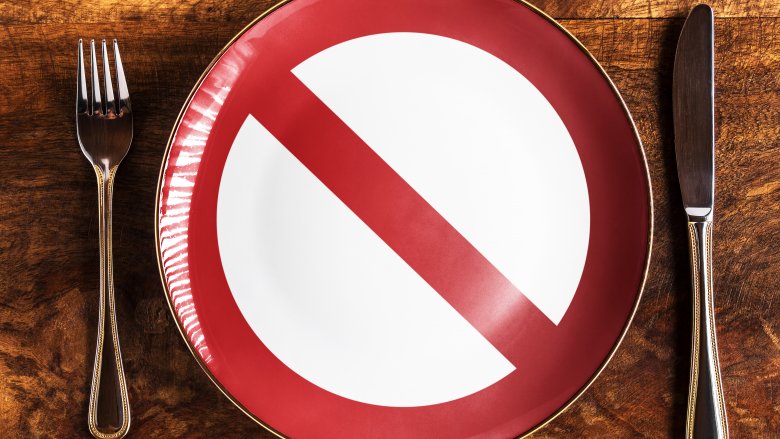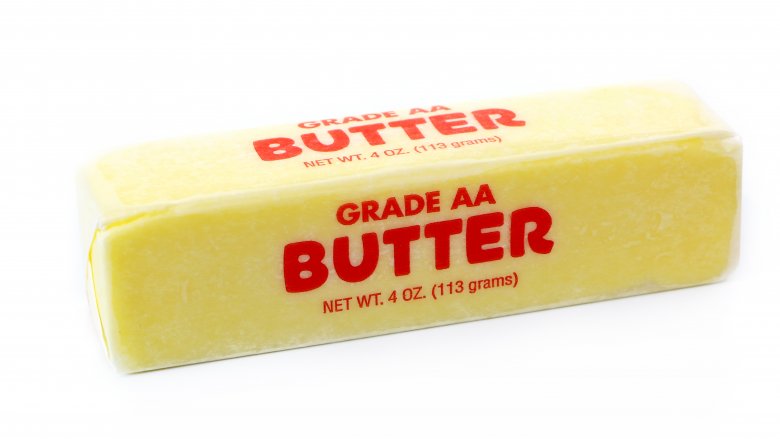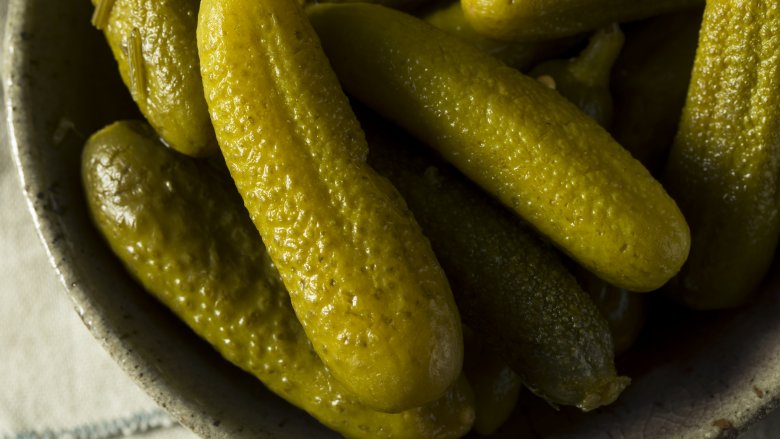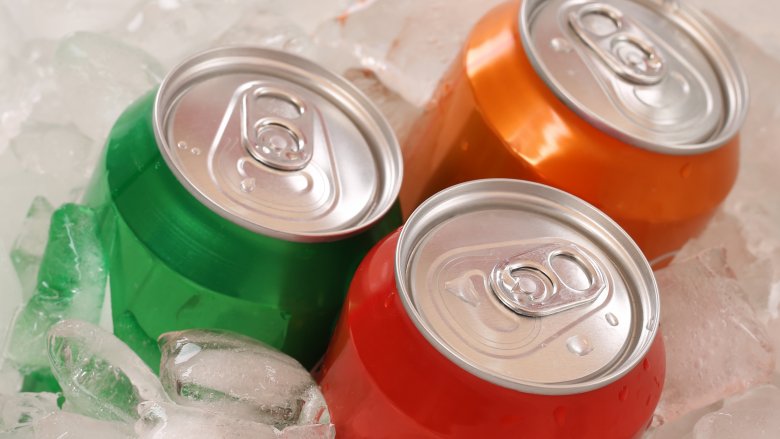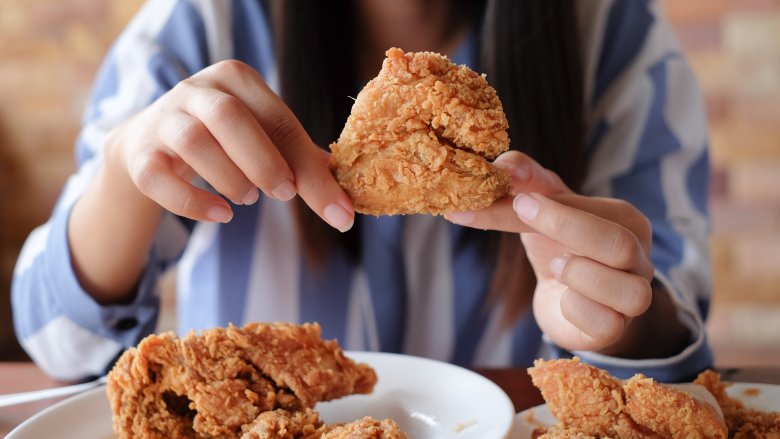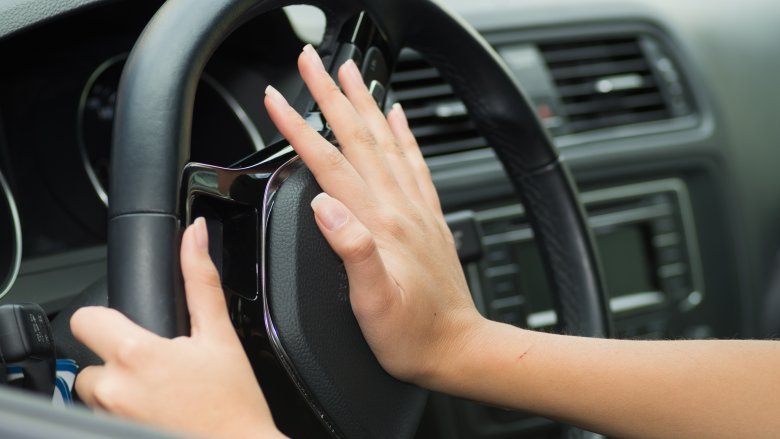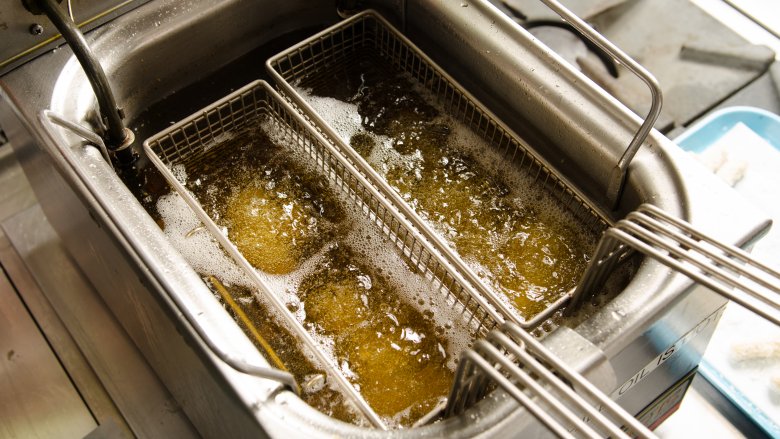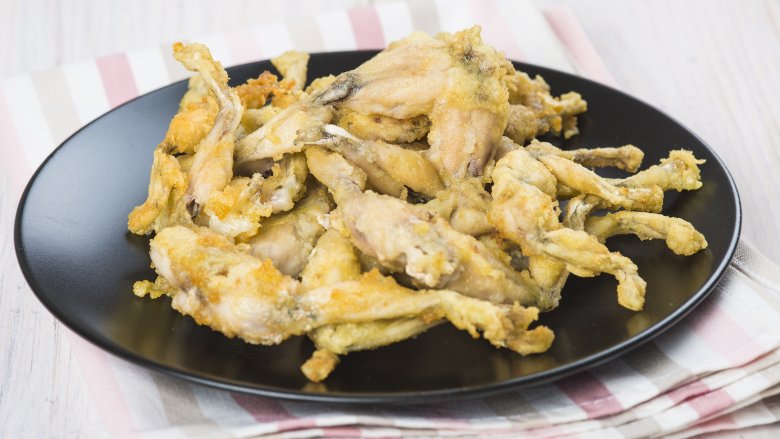Weirdest Food Laws In The US
We've all heard of "crimes against food," but it turns out laws involving food are totally real (and in some cases, totally ridiculous). While there are all kinds of laws out there that don't make sense, and some that the public is more highly aware of — thank you meter maid — here in America we have some weird food laws that sound almost too insane to be true. How you can eat fried chicken, what you can't do with an ice cream cone, where you can eat watermelon, strict pickle regulations, and even where you can and can't plan a picnic are all part of some of the strangest food laws that ever existed. Since you're probably not familiar with all the weird food legislation that has passed into law, we decided to round up some of the best. Laugh all you want, but seriously, we didn't make this stuff up. From the arguably practical to the downright absurd, these weird food laws actually exist.
This Indiana city does not tolerate watermelon in their parks
On a beautiful sunny day, there's nothing quite like having a relaxing picnic in the park with a big juicy slice of watermelon. Unfortunately for the park goers in Beech Grove, Indiana, eating watermelon is not an option for their picnic baskets. Watermelon has been banned from the parks thanks to their sharp rinds puncturing trash bags. Supposedly after creating a mess, an ordinance was put into motion to prevent this type of situation from occurring again.
Don't worry watermelon lovers, there is an upside to this ridiculous fruit ban. Despite the ordinance, they haven't actually had any problem with watermelon eaters. In fact, according to one local detective, the ordinance has never even been enforced. So go on, munch away on all the watermelon you want. Just do the park garbage collectors a favor and dispose of your rinds elsewhere. Or at least slice up the watermelon and ditch the rinds before visiting the park.
Margarine is a crime against butter in these Wisconsin facilities
When it comes to the debate of margarine versus butter, things can get a little heated. While some people actually prefer the taste of the butter substitute, others just can't tolerate the fake stuff at all. The state of Wisconsin falls into the latter category. Considering the Wisconsin law that no person at any state institution can be served a butter substitute (including inmates) you might assume the good people of Wisconsin just really hate margarine. The truth makes a little bit more sense.
Margarine came to the US in the 1800s and was soon banned in several states as a way to protect the dairy industry. Its low cost won it fans and eventually it was eased into the American market — at least everywhere but Wisconsin. By the middle of the 1960s, Wisconsin was the only remaining state to ban margarine, and that law is still on the books today. Unless they have a doctor's note, every student, patient, and inmate shall be served real butter.
Due to new health guidelines and tight budgets, many entities have now found loopholes around that law and schools, hospitals and some county jails now serve butter substitutes. State prisons, however, are still on the hook for serving the real stuff. Guess there's at least one perk to being incarcerated — that is, if you're one of the people that prefers butter.
Connecticut has some weird pickle regulations
Pickling a cucumber is a relatively easy process. Take some firm cucumbers, pack them into a glass jar with a brine of vinegar and salt water that has been brought to a boil, add in spices of your choice, and then let the pickles sit for a couple days in the refrigerator before eating. That doesn't sound too complicated, that is, unless you live in Connecticut. Connecticut must really love pickles because they are serious about what can be constituted as a pickle. So much so that if a cucumber doesn't bounce, then it can't be called a pickle. Technically, this isn't a law, but there are several statutes and regulations in place that suggest that a pickle that does not bounce isn't much of a pickle at all. In fact, one man was arrested and fined $500 for packing non-bouncing pickles. Of course, there are also laboratory tests that can prove the same thing, but that's half as fun.
Liquor stores in Indiana can sell you liquor... but not this
If you're shopping at a liquor store in Indiana and get the desire for a cold soda pop, you're out of luck. According to Indiana law, it's illegal for a liquor store to sell refrigerated soda. The law doesn't end there on cold commodities. It's also illegal for a liquor store to sell chilled mineral water, charged water, grenadine, ginger ale, and flavoring extracts. Maybe they're trying to crack down on all those classic cocktail enthusiasts who like to mix up a hard beverage in the parking lot? Actually, it makes a lot more sense when you realize this is a law that actually goes two ways: Grocery stores in Indiana cannot sell cold beer, either. According to the Indianapolis Star, the liquor store industry in Indiana has fought hard to keep this law on the books because it's what sets them apart from other businesses. Since Indiana is one of 26 states that allows liquor to be sold in grocery stores that hold the correct permits. Basically, you can buy your beer with the rest of your groceries — but if you want it cold, you're going to have to make another stop.
This Georgia town doesn't mix fried chicken with one utensil
There are just some foods it seems it would be a crime to eat with a knife and a fork. A slice of pizza, corn on the cob, any food on a stick, a Twinkie, and definitely fried chicken. The proper etiquette for eating these foods is by using your hand — and this weird food law demonstrates that fact. In fact, if you're in Gainesville, Georgia it's actually a crime to eat fried chicken with a knife and a fork. In this one particular southern town, fried chicken can only be eaten by using your fingers. It sounds like a ludicrous law, but it's real — and no one is above it. According to The Gainvesville Times, Ginny Dietrick was enjoying fried chicken in Gainesville on her 91st birthday when she was arrested for using a fork. Although the whole thing turned out to be a prank and she was pardoned by the mayor, it's still a law that exists. It was created in 1961, and at the time was meant as a joke to reinforce the fact that the city is the poultry capital of the world. Point taken, Gainesville.
This picnic spot is not an option in Delaware
There are many excellent spots to have a picnic. On a blanket in the grass, at a picnic table in the park, on the beach, and even when you summit on a hike. What's not such a good spot to have a picnic is on a highway. This may sound like a no-brainer, but apparently somebody must have tried it because Delaware had to make highway picnicking illegal. According to this weird food law, no person is allowed to tailgate whether it's in a vehicle or picnic on a street or highway within the limits of Fenwick Island. Causing a traffic jam in general by stopping a vehicle on the highway is never a good idea, so it makes sense that the good people of Delaware wouldn't want his to happen. The strange part is that they actually had to put it into law. While that's understandable, is light snacking while in a moving vehicle on the highway considered to be illegal? Just want to clarify because it's hard to pass up a good road snack.
Mississippi has a law against portion control
It's no secret that here in America, we love large portions of food and drink. As a means to combat obesity, however, some states have taken to banning supersized portions. Mississippi on the other hand has done the exact opposite. It may sound weird to make it illegal to make something illegal, but that's exactly what they did. The Mississippi governor signed a law that makes it illegal for any county or town to pass a law restricting portion sizes. Want a supersized Coke at the drive-thru? Go right ahead. You're dietary decisions won't be micro-managed in Mississippi.
The new law passed and was dubbed the "Anti-Bloomberg Bill" in honor of the New York City Mayor Michael Bloomberg who placed a ban on restaurants and other food retailers from serving sugary drinks in more than 16-ounce servings. Apparently, Mississippi believes it's up to the people to decide what they want — despite having one of the highest obesity rates. New York can do what they want, but Mississippi is sticking with the Big Gulp.
Arkansas sandwich shops don't appreciate this noise at night
In case you weren't familiar, the appropriate time to use a car horn is when other drivers need to be warned of a road hazard. What's not an appropriate is to use a car horn is in front of a sandwich shop after 9 p.m. Wait, what? Believe it or not, this is actually a law that exists. According to the law, if you're in Little Rock, Arkansas it is illegal to honk your car horn after 9 p.m. if you are in front of a sandwich shop or anywhere where cold drinks are sold. This weird law most likely has to do with the fact that a car horn is considered to be a noise disturbance, which apparently they take very seriously. While most sandwich shops seem to cater more to the lunch crowd, in Little Rock they must really love their late dinner crowd.
Taking used kitchen grease is a huge deal in one state
North Carolina may take pride in their barbecue, grits, fried green tomatoes, and cookout locations, but they also take pride in their used cooking grease. So much pride, that it is considered a crime to take it without asking. How much you steal, however, determines the severity of the punishment. Snatch under $1,000 worth of grease, and it's considered to be a Class 1 misdemeanor. Steal over $1,000 on the other hand and it's considered to be a felony. To put things in perspective, a Class 1 misdemeanor would be along the lines of assault or battery which can land you up to 150 days in jail. A felony on the other hand, could set you back a couple years. It may seem crazy to be so worried about nasty old used grease, but there's actually a market for it since it's used in things like beauty products and animal feed. If you want in on the grease game though, you'll have to do it fair and square.
Food vendors have serious dress codes in Florida
Usually it's up to the discretion of an employer to tell their employees what to wear to work. In Broward County, Florida, it's the law that lets you know. Specifically, the law is geared toward letting mobile food vendors know what they can wear to work. Broward County law states that mobile food vendors are not allowed to dress provocatively in any way. To do so would be considered a hazard or an obstruction of traffic (apparently, rubber-neckers are big problem in this part of the US). The law goes into rather great detail to discuss what exposed parts of the human body along with what types of clothing are considered unacceptable. While some of the clothing items totally make sense, it does seem odd that a beach county would find T-back bathing suits unacceptable. Sorry vendors, you can't go straight from the beach to work, that is, unless you're really good at hiding your bathing suit from law officials stopping by for a quick bite.
These California frogs are exempt from the dinner table
It's no secret that eating frog legs is a thing (especially overseas) — even though not everyone is on board with the controversial delicacy. In California though, once you turn a regular frog into a competition frog by entering it into a frog-jumping contest, it's officially off the table for consumption. According to the state law, you may possess as many of these hopping competitors as you wish, but if one just so happens to die or is killed, you absolutely may not eat it. So what do you do with a dead competing frog? Legally, you must destroy it immediately (or at least as soon as possible). The law also states that deceased competition frogs may not be "otherwise used for any purpose." So much for that champion frog leg appetizer you've been dreaming of — at least in California.
